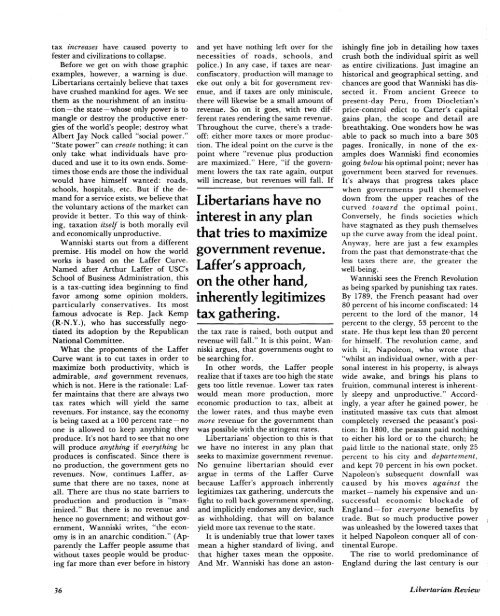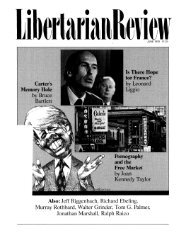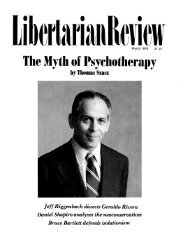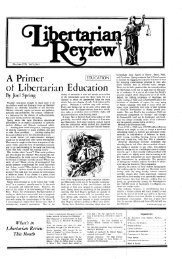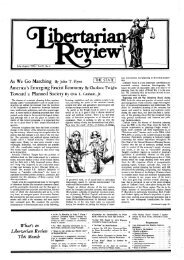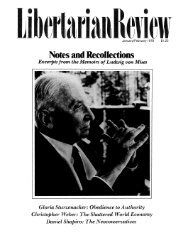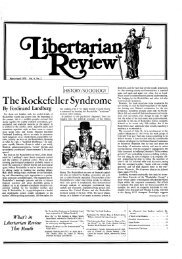The Libertarian Review July 1978 - Libertarianism.org
The Libertarian Review July 1978 - Libertarianism.org
The Libertarian Review July 1978 - Libertarianism.org
Create successful ePaper yourself
Turn your PDF publications into a flip-book with our unique Google optimized e-Paper software.
tax increases have caused poverty tofester and civilizations to collapse.Before we get on with those graphicexamples, however, a warning is due.<strong>Libertarian</strong>s certainly believe that taxeshave crushed mankind for ages. We seethem as the nourishment of an institution-the state- whose only power is tomangle or destroy the productive energiesof the world's people; destroy whatAlbert Jay Nock called "social power.""State power" can create nothing; it canonly take what individuals have producedand use it to its own ends. Sometimesthose ends are those the individualwould have himself wanted: roads,schools, hospitals, etc. But if the demandfor a service exists, we believe thatthe voluntary actions of the market canprovide it better. To this way of thinking,taxation itself is both morally eviland economically unproductive.Wanniski starts out from a differentpremise. His model on how the worldworks is based on the Laffer Curve.Named after Arthur Laffer of USC'sSchool of Business Administration, thisis a tax-cutting idea beginning to findfavor among some opinion molders,particularly conservatives. Its mostfamous advocate is Rep. Jack Kemp(R-N .Y.), who has successfully negotiatedits adoption by the RepublicanNational Committee.What the proponents of the LafferCurve want is to cut taxes in order tomaximize both productivity, which isadmirable, and government revenues,which is not. Here is the rationale: Laffermaintains that there are always twotax rates which will yield the samerevenues. For instance, say the economyis being taxed at a 100 percent rate-noone is allowed to keep anything theyproduce. It's not hard to see that no onewill produce anything if everything heproduces is confiscated. Since there isno production, the government gets norevenues. Now, continues Laffer, assumethat there are no taxes, none atall. <strong>The</strong>re are thus no state barriers toproduction and production is "maximized."But there is no revenue andhence no government; and without government,Wanniski writes, "the economyis in an anarchic condition." (Apparentlythe Laffer people assume thatwithout taxes people would be producingfar more than ever before in historyand yet have nothing left over for thenecessities of roads, schools, andpolice.) In any case, if taxes are nearconfiscatory,production will manage toeke out only a bit for government revenue,and if taxes are only miniscule,there will likewise be a small amount ofrevenue. So on it goes, with two differentrates rendering the same revenue.Throughout the curve, there's a tradeoff:either more taxes or more production.<strong>The</strong> ideal point on the curve is thepoint where "revenue plus productionare maximized." Here, "if the governmentlowers the tax rate again, outputwill increase, but revenues will fall. If<strong>Libertarian</strong>s have nointerest in any planthat tries to ntaxintizegovernntent revenue.Laffer's approach,on the other hand,inherently legitintizestax gathering.the tax rate is raised, both output andrevenue will fall." It is this point, Wanniskiargues, that governments ought tobe searching for.In other words, the Laffer peoplerealize that if taxes are too high the stategets too little revenue. Lower tax rateswould mean more production, moreeconomic production to tax, albeit atthe lower rates, and thus maybe evenmore revenue for the government thanwas possible with the stringentrates.<strong>Libertarian</strong>s' objection to this is thatwe have no interest in any plan thatseeks to maximize government revenue.No genuine libertarian should everargue in terms of the Laffer Curvebecause Laffer's approach inherentlylegitimizes tax gathering, undercuts thefight to roll back government spending,and implicitly endorses any device, suchas withholding, that will on balanceyield more tax revenue to the state.It is undeniably true that lower taxesmean a higher standard of living, andthat higher taxes mean the opposite.And Mr. Wanniski has done an astonishinglyfine job in detailing how taxescrush both the individual spirit as wellas entire civilizations. Just imagine anhistorical and geographical setting, andchances are good that Wanniski has dissectedit. From ancient Greece topresent-day Peru, from Diocletian'sprice-control edict to Carter's capitalgains plan, the scope and detail arebreathtaking. One wonders how he wasable to pack so much into a bare 303pages. Ironically, in none of the examplesdoes Wanniski find .economiesgoing below his optimal point; never hasgovernment been starved for revenues.It's always that progress takes placewhen governments pull themselvesdown from the upper reaches of thecurved toward the optimal point.Conversely, he finds societies whichhave stagnated as they push themselvesup the curve away from the ideal point.Anyway, here are just a few examplesfrom the past that demonstrate-,that theless taxes there are, the greater thewell-being.Wanniski sees the French Revolutionas being sparked by punishing tax rates.By 1789, the French peasant had over80 percent of his income confiscated: 14percent to the lord of the manor, 14percent to the clergy, 53 percent to thestate. He thus kept less than 20 percentfor himself. <strong>The</strong> revolution came, andwith it, Napoleon, who wrote that"whilst an individual owner, with a personalinterest in his property, is alwayswide awake, and brings his plans tofruition, communal interest is inherentlysleepy and unproductive." Accordingly'a year after he gained power, heinstituted massive tax cuts that almostcompletely reversed the peasant's position:In 1800, the peasant paid nothingto either his lord or to the church; hepaid little to the national state, only 25percent to his city and departement,and kept 70 percent in his own pocket.Napoleon's subsequent downfall wascaused by his moves against themarket-namely his expensive and unsuccessfuleconomic blockade ofEngland- for everyone benefits bytrade. But so much productive powerwas unleashed by the lowered taxes thatit helped Napoleon conquer all of continentalEurope.<strong>The</strong> rise to world predominance ofEngland during the last century is our36<strong>Libertarian</strong> <strong>Review</strong>


